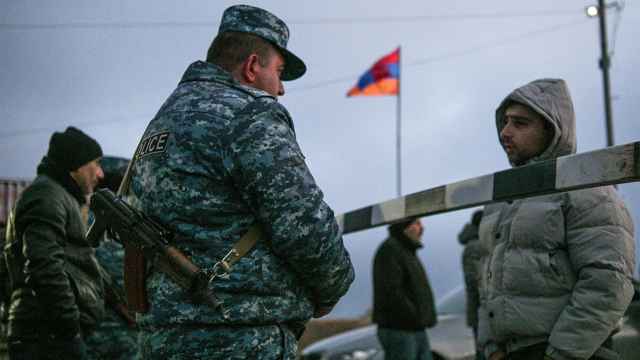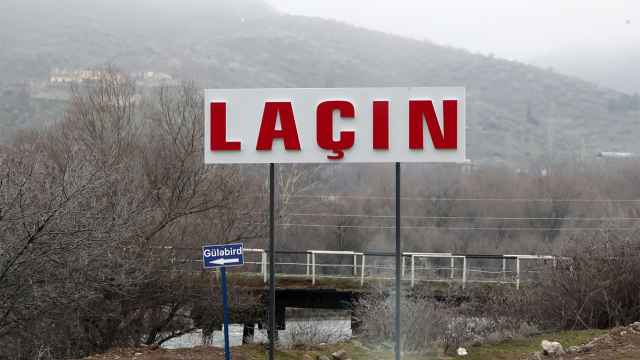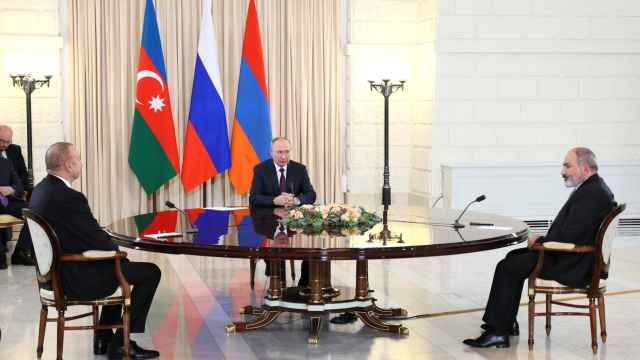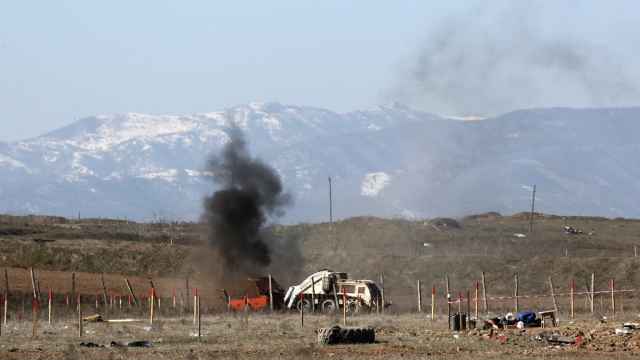The flood of refugees from Nagorno-Karabakh dwindled to a trickle Saturday as Armenia said nearly the entire population of the breakaway territory had already fled since Azerbaijan seized back control.
An AFP journalist at the Kornidzor crossing into Armenia saw only several ambulances arrive as border guards said they were waiting for a final few buses.
In the nearest town of Goris, hundreds of exhausted refugees waited with their baggage in the central square for the government to provide accommodation.
Azerbaijan's lightning military takeover of the ethnic Armenian enclave last week sparked a sudden exodus that has rewritten the centuries-old ethnic makeup of the disputed region.
Armenia said Saturday that over 100,000 people from an estimated population of 120,000 had fled since the breakaway region saw its decades-long fight against Azerbaijani rule end in sudden defeat.
Artak Beglaryan, a former separatist official, said that according to unofficial information "the last groups" of Nagorno-Karabakh residents were on their way to Armenia on Saturday.
"At most a few hundred persons remain, most of whom are officials, emergency services employees, volunteers, some persons with special needs," he wrote on social media.
Yerevan has accused Azerbaijan of conducting a campaign of "ethnic cleansing" to clear Nagorno-Karabakh of its Armenian population.
But Baku has denied the claim and has publicly called on the Armenian residents of the territory to stay and "reintegrate" into Azerbaijan.
The United Nations has said it will send a mission to Nagorno-Karabakh this weekend, mainly to assess humanitarian needs, the first time the international body has had access to the region in about 30 years.
Armenia has asked the UN's highest court to take urgent measures to protect the enclave's inhabitants, the court announced on Friday.
Yerevan urged the International Court of Justice (ICJ) to ensure that Azerbaijan does not move to displace the remaining ethnic Armenians in Nagorno-Karabakh or prevent "the safe and expeditious return" of those who have already fled.
The International Federation of Red Cross and Red Crescent Societies on Friday announced an emergency appeal for 20 million Swiss Francs ($22 million) to help the refugees.
Frozen Conflict
The Azerbaijani offensive was both the shortest and most decisive of any conflict the predominantly Christian Armenian and Muslim Azerbaijani rivals have waged since the region's status became disputed with the collapse of the Soviet Union.
The separatists agreed on Thursday to dissolve their government and become a formal part of Azerbaijan by the end of the year.
The decision marked the end of one of the world's longest and seemingly most intractable "frozen conflicts" — one that Azerbaijan was able to finally win while longstanding Armenian ally Russia was bogged down in its war on Ukraine.
Azerbaijan is now holding "re-integration" talks with separatist leaders while at the same time detaining some senior figures from its former government and military command.
Nagorno-Karabakh is internationally recognized as part of Azerbaijan — a status it has enjoyed since the Soviet authorities incorporated the territory into Azerbaijan in the 1920s.
But it has been populated by ethnic Armenians since at least the 2nd century BC and is viewed by many in Armenia as an ancestral homeland.
Pressure on Pashinyan
Supporters of Nagorno-Karabakh's independence had staged six days of anti-government protests in Yerevan but paused the demonstrations this week to help Armenian Prime Minister Nikol Pashinyan focus on helping refugees from the disputed region.
Protesters intend to hold another large rally on Saturday aimed at punishing Pashinyan for deciding not to help separatist forces fight Azerbaijan.
Pashinyan has tried to deflect the blame on Russia.
Moscow has deployed peacekeepers in the region that were meant to police a truce ending the 2020 war, in which Baku clawed back some of the lands it lost to the separatists in the 1990s.
Pashinyan called Yerevan's current alliances "ineffective" and urged parliament in next week's session to ratify a document that would make Armenia a member of the International Criminal Court.
The ICC has issued an international arrest warrant for Russian President Vladimir Putin.
The Kremlin said it would treat Armenia's ICC membership as an "extremely hostile" step.
A Message from The Moscow Times:
Dear readers,
We are facing unprecedented challenges. Russia's Prosecutor General's Office has designated The Moscow Times as an "undesirable" organization, criminalizing our work and putting our staff at risk of prosecution. This follows our earlier unjust labeling as a "foreign agent."
These actions are direct attempts to silence independent journalism in Russia. The authorities claim our work "discredits the decisions of the Russian leadership." We see things differently: we strive to provide accurate, unbiased reporting on Russia.
We, the journalists of The Moscow Times, refuse to be silenced. But to continue our work, we need your help.
Your support, no matter how small, makes a world of difference. If you can, please support us monthly starting from just $2. It's quick to set up, and every contribution makes a significant impact.
By supporting The Moscow Times, you're defending open, independent journalism in the face of repression. Thank you for standing with us.
Remind me later.






